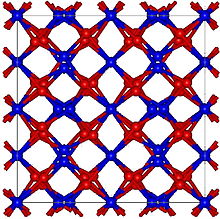|
Terbium(III) oxide
Terbium(III) oxide, also known as terbium sesquioxide, is a sesquioxide of the rare earth metal terbium, having chemical formula Tb
It is a basic oxide and easily dissolved to dilute acids, and then almost colourless terbium salt is formed.
The crystal structure is cubic and the lattice constant is a = 1057 pm.[5] References
|
||||||||||||||||||||||||||||||||||||||||||||||||||||||||||||||||||||||||||||


